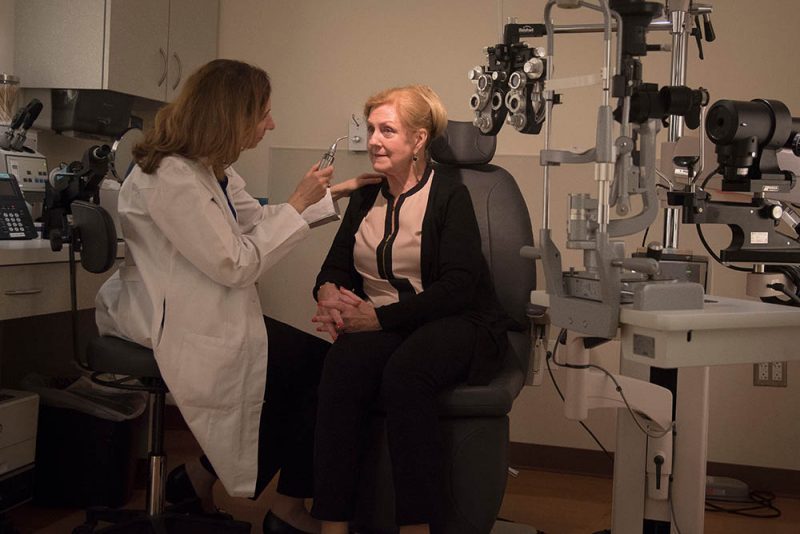Dr. Jan Kylstra, a retina specialist at Mass. Eye and Ear, breaks down diabetic eye disease
Diabetes affects the body’s ability to control blood sugar levels. The longer you have diabetes — and the less controlled your blood sugar — the higher your risk of developing complications like vision loss. This complication, known as diabetic eye disease, is the leading cause of blindness in middle-aged adults.
The good news is that early diagnosis and treatment combined with a healthy lifestyle can prevent most diabetes-related eye problems.
Why is high blood sugar a problem?
Having too much sugar in the blood over a long period of time can damage the vessels that supply blood to vital organs. If left untreated, diabetes can lead to conditions like heart disease and stroke, kidney disease, nerve problems and diabetic eye disease, said Jan A. Kylstra, MD, a retina specialist at Mass. Eye and Ear.
What is diabetic eye disease?
Diabetes can affect the eyes in a number of ways, but diabetic retinopathy is by far the most common and serious complication. A leading cause of moderate-to-severe vision loss in middle-aged Americans, diabetic retinopathy occurs when blood vessels to the light-sensitive tissue at the back of the eye (retina) are damaged.
“In the early stages of diabetic retinopathy, the blood vessels may bulge and leak,” Dr. Kylstra explained. If the fluid leakage worsens, it can build up in the surrounding retinal tissue and cause swelling. In some patients, the center of the retina swells, causing macular edema. If left untreated, this swelling can lead to fuzzy spots in your central vision, which can make it difficult to read, drive or recognize faces.”
If diabetic retinopathy worsens over the years, new, abnormally fragile, blood vessels and scar tissue can develop on the surface of the retina. This is called proliferative diabetic retinopathy. The condition is associated with a significant risk of severe bleeding into the center of the eye (called vitreous hemorrhage) and retinal detachment.
In addition to retinopathy, people with diabetes also have an increased risk of developing cataracts and, less commonly, glaucoma.

What symptoms should you look out for?
The early stages of diabetic eye disease typically cause few-to-no symptoms.
“Just because your vision is fine doesn’t necessarily mean your eyes are healthy,” Dr. Kylstra cautions. “It’s important to have regular eye exams if you have diabetes because vision loss can progress rapidly without treatment.”
Eventually, however, many patients with longstanding diabetes develop macular edema or proliferative retinopathy. If not treated, these conditions will lead to blurry central vision or a dramatic decrease in vision while seeing black or red spots.
If you experience a sudden increase in the number and size of floaters (dark spots in your vision), blurry central vision, shadows in your central or side vision or a dramatic decrease in vision, Dr. Kylstra recommends seeing an ophthalmologist within three days.
How often should diabetic patients see an ophthalmologist?
Routine visits with an ophthalmologist are important to preserving your vision. If you’ve been diagnosed with diabetes, you should see an ophthalmologist at least once a year. Depending on your eye health and how well your diabetes is managed, your doctor may recommend more frequent visits.
How effective is treatment?
With early detection and prompt treatment, patients with diabetes can reduce their risk of vision loss by more than 90 percent, said Dr. Kylstra.
Your specific treatment plan will depend on the type and severity of your eye disease. For instance, if you have early diabetic retinopathy, your doctor may focus on improving your diabetes management and recommend frequent eye exams.
For more advanced cases, laser treatment can help prevent vision loss from macular edema. It can also greatly reduce the risk of bleeding into the eye in patients with proliferative retinopathy.
If macular edema has already caused some vision loss, eye injections with anti-VEGF medications can often help restore some sight.
And if you have severe vision loss from leaky blood vessels or a retinal detachment, surgery can often improve sight.
“However, it’s important to realize that early treatment — when the vision is still good — is more effective than waiting until vision loss is severe,” cautions Dr. Kylstra “The earlier you start treatment, the better your prognosis.”
Want to learn more?
Read these sight-saving tips for people living with diabetes.
About our expert
 Dr. Jan Kylstra specializes in the surgical and medical management of retinal diseases, including diabetic retinopathy. He sees patients at Mass. Eye and Ear’s Longwood and Stoneham locations.
Dr. Jan Kylstra specializes in the surgical and medical management of retinal diseases, including diabetic retinopathy. He sees patients at Mass. Eye and Ear’s Longwood and Stoneham locations.